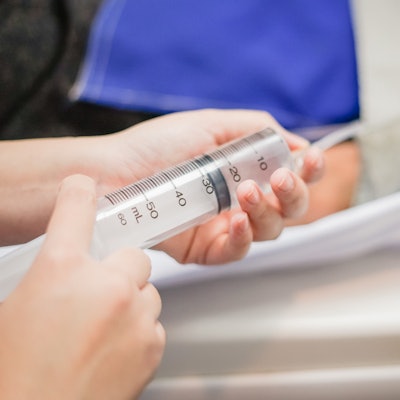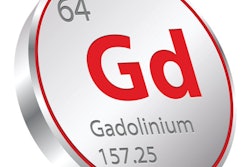
Patients who have allergic reactions to iodinated contrast agents used in CT exams may also be at higher risk for allergic reactions from gadolinium-based contrast agents (GBCA) used with MRI, according to a study published February 22 in Radiology.
The findings highlight the need to carefully assess the contrast reaction history in patients undergoing MRI scans, said senior author Dr. Hye-Ryun Kang, PhD, of Seoul National University College of Medicine in South Korea, in a statement released by the RSNA.
"Traditionally, a history of iodinated contrast media hypersensitivity was not considered as a risk factor for hypersensitivity to GBCAs and vice versa, owing to the structural and compositional differences between the two," she said. "The results of our study challenge this idea."
GBCAs are commonly used with MRI exams, and although they are generally considered safe, their increased use has translated into higher rates of allergic reactions, wrote a team led by lead author Dr. Yoon Hae Ahn, also of Seoul National University.
The group sought to investigate any connection between allergic reactions from iodinated contrast agents and GBCAs. The team analyzed 331,070 cases of GBCA exposure in 154,539 patients over an eight-year period. Of these total cases, there were 1,304 allergic reactions (0.4%); of these allergic reactions, 0.4% were acute.
Ahn's team found the following:
- Patients who had a history of allergic reactions to iodinated contrast were 4.6 times more likely to have a reaction to GBCAs.
- Recurrence rate of allergic reactions to GBCAs was highest in patients who didn't receive premedication or switched to a different GBCA.
- Those patients who both received premedication before undergoing MRI and switched to a different GBCA had the lowest rate of allergic reaction recurrence, at 5%.
- Patients who just received premedication had an allergic reaction recurrence rate of 19%, while those who just switched to a different GBCA had a rate of 6%.
This increased risk of reaction to GBCAs used with MRI after reaction to iodinated contrast with CT may be due to a predisposition to drug allergies rather than cross-reactivity, the investigators noted.
Regardless of cause, how can the problem of contrast reactions be addressed? Patients should be assessed for any prior allergic responses to contrast, the authors urged.
"In all patients undergoing MRI with GBCA exposure, a detailed history of previous hypersensitivity reactions should be conducted, and when necessary, appropriate prevention measures such as using premedication and switching to a different type of GBCA should be implemented," they wrote.
The study suggests more research is needed, according to an accompanying editorial written by Dr. David Kallmes and Jennifer McDonald, PhD, both of the Mayo Clinic in Rochester, MN.
"Ahn and Kang et al have provided intriguing new data about potential risk factors and preventative measures for acute and delayed reactions to gadolinium-based contrast agents," they wrote. "Such findings merit further investigation to improve contrast material safety and patient care."




















